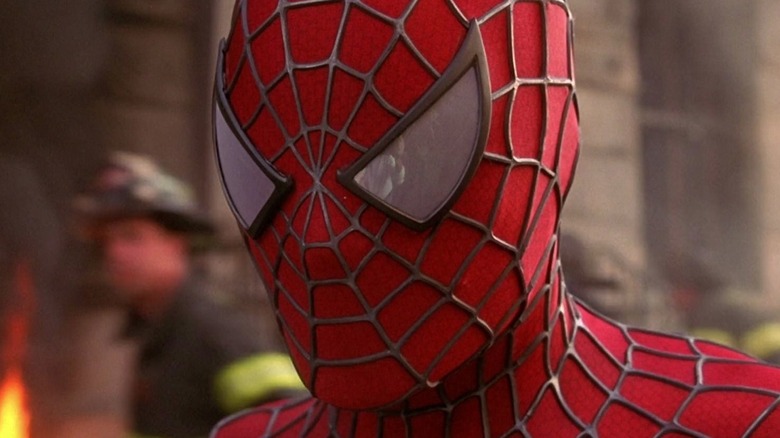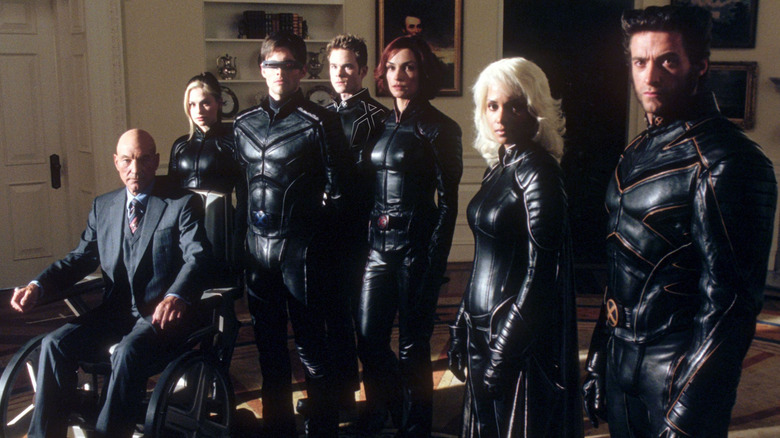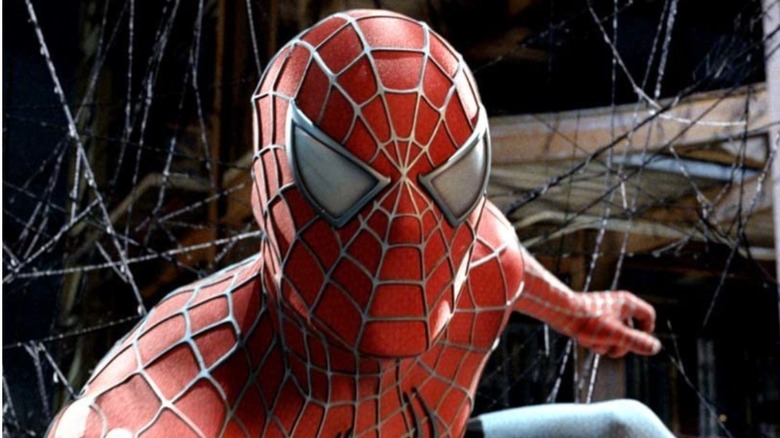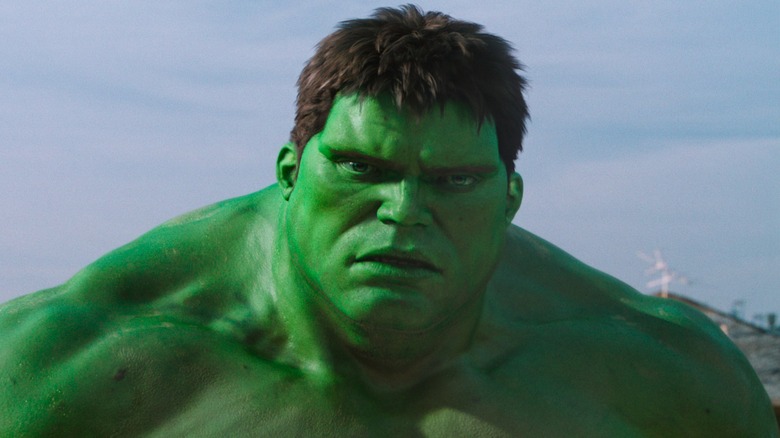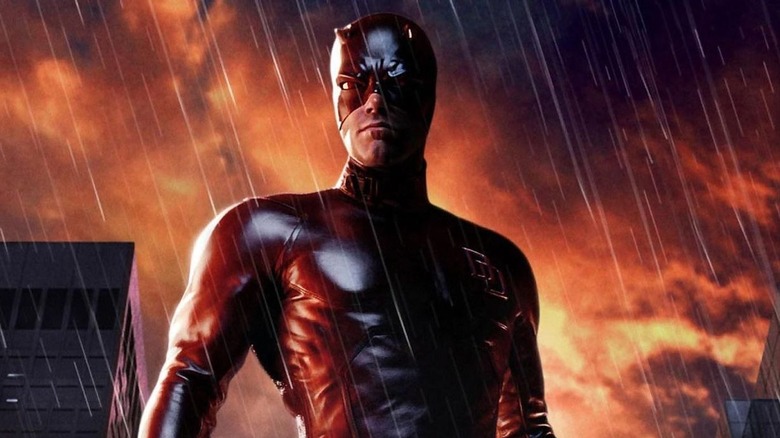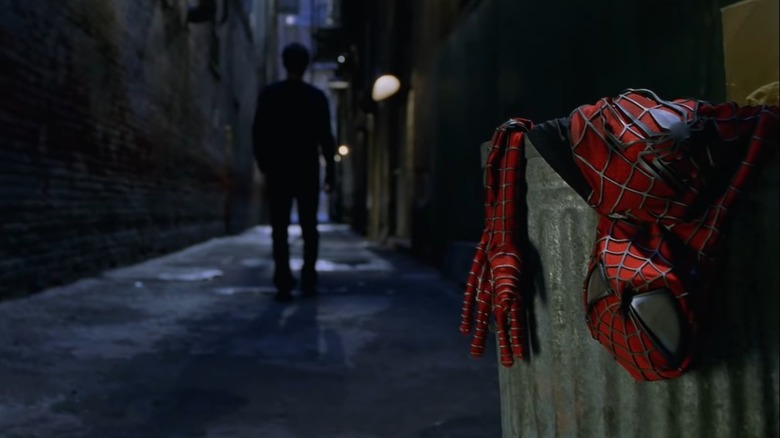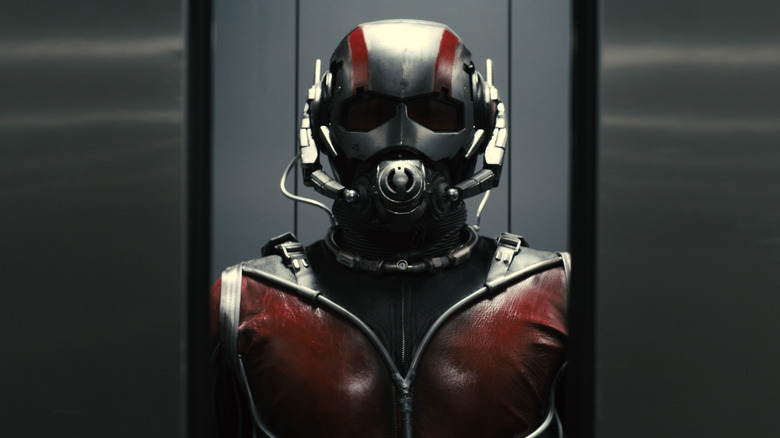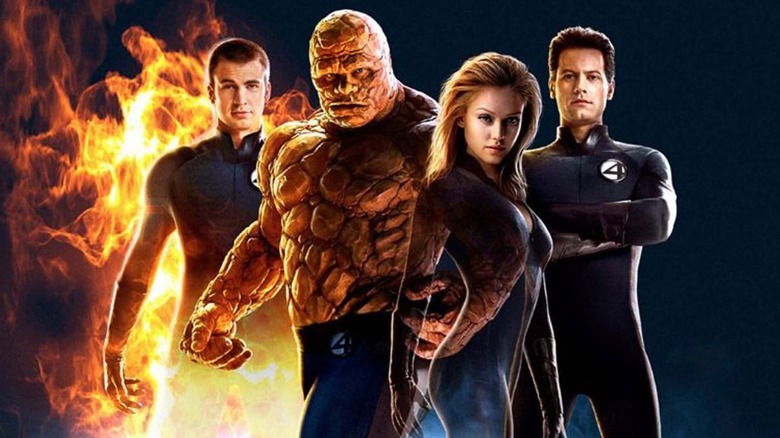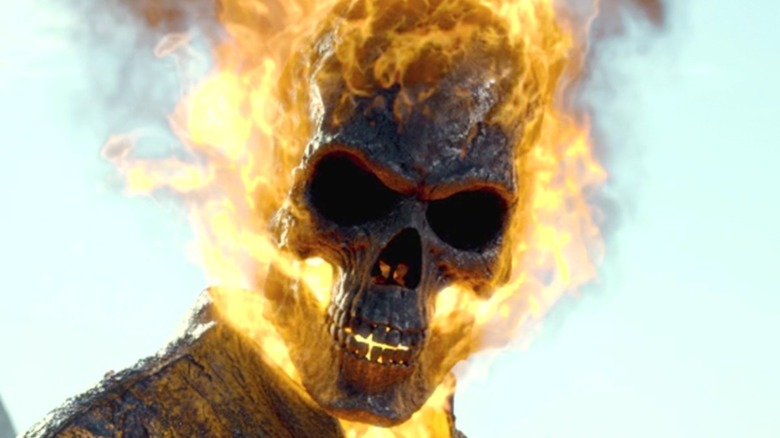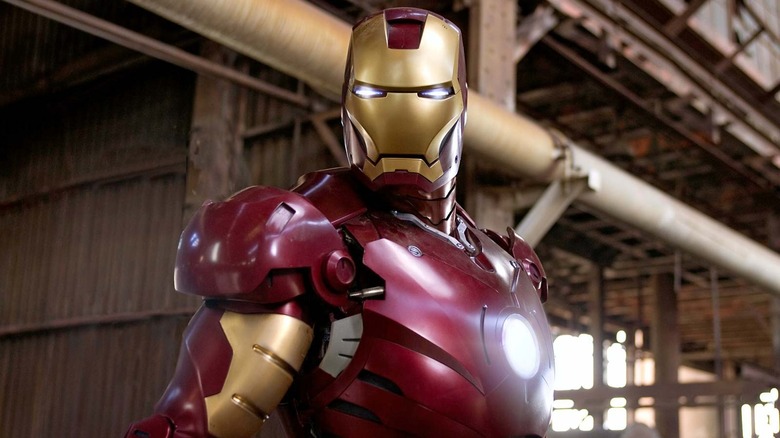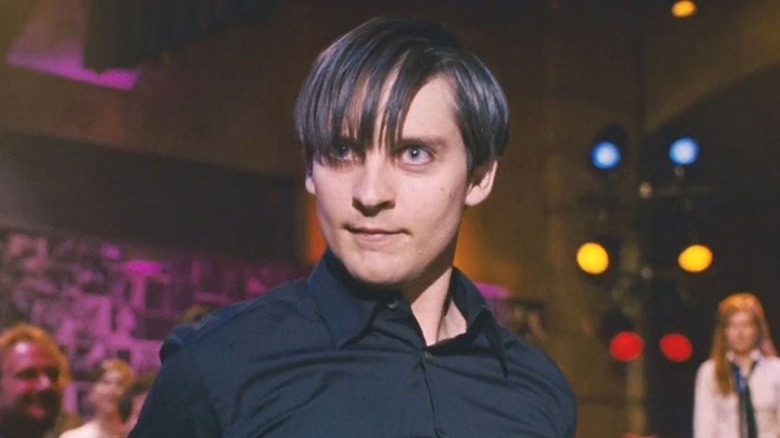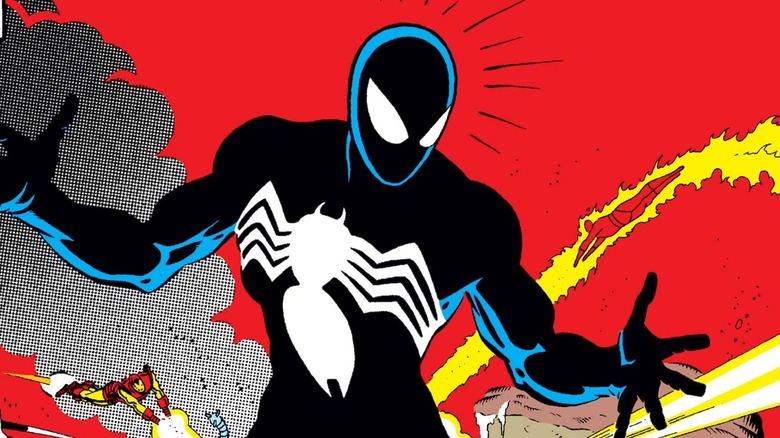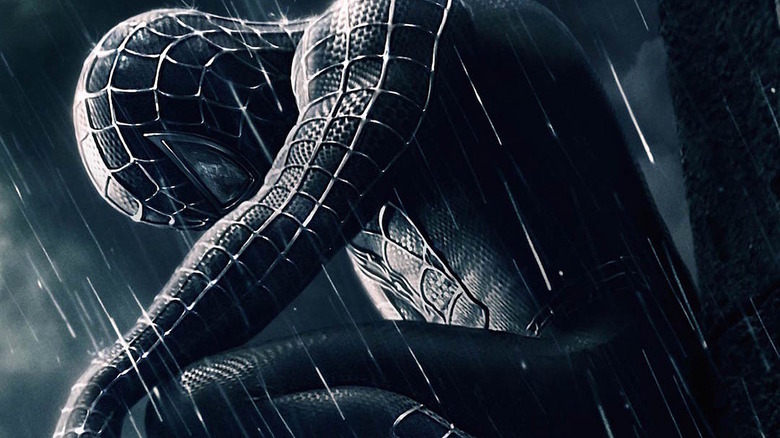What If The MCU Had Been Unified From The Beginning?
Most of us are at least somewhat familiar with the story of how the Marvel Cinematic Universe came to be. Faced with bankruptcy in the mid-'90s, Marvel famously sold off the rights to its most popular characters. Encouraged by the successes of those properties — specifically, the X-Men (owned by Fox) and Spider-Man (owned by Sony) — the company then decided to use the characters it still held to launch an independent movie studio. Fortunately, those characters happened to include the core members of the Avengers. That circumstance, combined with the novel idea to create a shared film universe much like the one comics fans had been enjoying for decades, birthed the single biggest film franchise in history.
However, this very same franchise (and at least one mainstream interpretation of quantum physics) teaches us that there exists a multiverse, one in which all possible realities come to pass. Let's consider one such alternate reality, one in which the comics industry didn't see a hardcore slump in the early '90s, mighty Marvel was never in danger of going under, and those potentially lucrative movie rights stayed under the same roof. In the parlance of one of Marvel's wildly popular Disney+ television series, come with us while we explore the question: What if... the Marvel Cinematic Universe had been unified from the beginning?
The X-Men give birth to the MCU
In this universe, modern superhero cinema begins in roughly the same place as in ours: 2000, with the release of Bryan Singer's "X-Men." "Blade," considered too dark of a property to help launch the shared universe, enters into development hell. As a sort of proof-of-concept for "grounded" takes on superheroes as well as the very idea of a shared cinematic universe, the film works quite well and is a spectacular success with audiences. This is thanks to several carefully selected allusions to other properties (notably Spider-Man) that would seem shoehorned-in to us, but play like gangbusters to a turn-of-the-century crowd whose last notable comic book film was "Batman and Robin."
His star-making turn as Wolverine, arguably Marvel's most popular character at the time, makes an instant superstar of Hugh Jackman, who immediately becomes the face of the franchise and is locked down with a nine-picture contract. The MCU's first post-credits scene sets up the movie's villain Magneto as a recurring, franchise-wide Big Bad, while also introducing the Daily Bugle and its windbag editor, J. Jonah Jameson.
Interestingly, in this universe, as in ours, "X-Men" is made with the involvement of a young, green executive by the name of Kevin Feige. Unfortunately, he is too young and green to be nearly as involved in the creative direction of the MCU, though he serves as an executive producer on all of its future films. This lack of a steady hand guiding the overall vision for the franchise will have severe consequences down the road.
Spider-Man boosts the franchise's popularity with Marvel's flagship hero
With its grounded, gritty-yet-fun aesthetic and hints at the larger universe, "X-Men" grosses just over $450 million at the worldwide box office. Intent on topping that total in grand fashion, Marvel takes its time with the follow-up: Sam Raimi's "Spider-Man," which hits theaters in the summer of 2002 to a rapturous reception from audiences and critics alike.
The film proceeds near-identically to its counterpart in our universe, with a couple of key differences. Jackman's Wolverine makes an appearance near the movie's end to battling Magneto's minions in a TV broadcast being watched in the Daily Bugle's newsroom, serving to solidify the "shared universe" concept. Then, there's the flick's post-credits scene, which sets its audiences on fire, so to speak. It features Tobey Maguire's Peter Parker being counseled in the ways of power and responsibility by Johnny Storm, the Human Torch, portrayed by a young actor named Chris Evans. There's precedent for this in the comics, in fact, as Spidey was similarly pep-talked by Johnny after his first defeat at the hands of Doctor Octopus.
"Spider-Man" is a smash hit, grossing just over $800 million worldwide and surpassing Marvel's wildest expectations. The equivalent of the Marvel Creative Committee (which, mercifully, does not include legendary curmudgeon Ike Perlmutter in this universe) is put together to help guide the overall direction of the MCU. Its initial focus: to mine the "X-Men" franchise for sequels and spin-offs, to develop "Spider-Man" into the flagship series, and to bring to the screen Marvel's other most well-known properties, the Hulk and Daredevil. With the former, Marvel wastes no time — because it so happens that the young MCU has drawn some interest from a genuinely great filmmaker.
Ang Lee's Hulk lends the new cinematic universe extra credibility
It's easy to forget that such a visionary filmmaker as Ang Lee directing a feature centered on the Hulk was a huge deal in our universe. In our alternate timeline — with audiences having been primed for the shared universe concept — 2003's "Hulk" is nothing short of a bombshell. The concept of the MCU sharpens Lee's vision (no Hulk dogs in this version), and brief appearances by both Jackman's Wolverine and Maguire's Spider-Man send audience enthusiasm through the roof. "Hulk" grosses $785 million worldwide — nearly triple our universe's take — and Eric Bana signs a deal for two sequels and one team-up feature.
Bana's deal indicates that Marvel Studios is heading toward some kind of event movie. As in "Spider-Man," all signs are pointing to the Fantastic Four, who pop up again in post-credits-scene following "Hulk" — with Reed Richards, portrayed by Daniel Day-Lewis, attempting to help Banner find a cure (Lewis is not quite so discriminating with his projects in this timeline). Unbeknownst to the general public, right around the time "Hulk" is released, a young television writer named Joss Whedon has just turned in his first draft of a "Fantastic Four" script. Later that year, around Halloween, Marvel takes its first big creative swing with one of its last remaining hugely popular properties.
Daredevil adds a huge star to the mix
The Ben Affleck-starring "Daredevil" makes a big splash in the young MCU — because in this universe, it's written and directed by Joe Carnahan, whose dark and gritty vision for the property died on the vine in our universe. Though Carnahan crafts an appropriately lean and mean origin story for Matt Murdock, he is obliged to shoehorn in brief appearances by Banner and Wolverine, and Spider-Man is practically a co-star. However, given Maguire and Affleck's chemistry and the characters' history in the comics, this ends up actually being a smart move.
"Daredevil" is the fourth critically-acclaimed smash hit in a row for Marvel, but this will end up being a huge mixed bag. The flick's ridiculous $815 million worldwide take will teach the studio one very wrongheaded lesson: to prioritize the inclusion of as many characters as possible over making solid standalone films. It's a lesson that plants the seeds of the franchise's failure as a whole — but 2004's "X-Men 2" racks up another $800 million and keeps audience engagement high.
Affleck will go on to acquit himself nicely and soldier through his contract before bowing out — mostly to direct, a passion he's also found in our universe. As a result of the experience, he never takes the role of Batman, feeling it would be redundant. Daredevil is the only major role to be recast, with Affleck eventually being replaced by Johnny Messner.
Spider-Man 2 is a totally different movie
In our universe, "Spider-Man 2" is still considered one of the best superhero films ever because it dove deep into the character and mined comic book lore for its most compelling angles. This can be seen in the influence that the celebrated "Spider-Man No More!" storyline had on the film, as the most iconic panel of that series was echoed in one of the movie's more famous shots.
In this alternate universe, though, returning director Raimi is forced to include much more world-building, and the movie suffers for it. While Alfred Molina does appear in the film, it's only in a glorified cameo as Dr. Otto Octavius (Sony having 'learned its lesson' from killing off Norman Osborn, the Green Goblin, in the first installment). Wolverine, Banner, and Affleck's Daredevil all get obligatory cameos. Meanwhile, the movie's story — which sees Spidey teaming up with other heroes to bring down Vulture, Scorpion, and Rhino — leans hard into advancing the overall narrative at the expense of functioning well as a standalone film.
"Spider-Man 2" is the first MCU effort to receive mixed reviews. However, it's also the first to crack $1 billion at the worldwide box office, a feat that our universe's MCU wouldn't achieve until 2012's "The Avengers." As a result, Marvel's Creative Committee doubles down on the team-ups for its future strategy — and some of the riskier properties that had been in development are left in the dust.
Ant-Man and others go nowhere
In this alternate universe as in ours, Edgar Wright pitches "Ant-Man" to Marvel in 2005. The pitch is, however, summarily shot down — and Scott Lang is far from alone in being denied entry into the alternate MCU. Having had massive, groundbreaking success mixing and matching its most popular characters, many of the Marvel headliners we're familiar with never come to pass. Some either languish in development hell, like Captain Marvel and Black Panther, while others are never developed to begin with, such as the Guardians of the Galaxy, whose feature was considered to be a massive gamble in our universe.
Rather, this far more risk-averse Marvel Studios takes a cautious approach. Two more characters are introduced in solo movies leading up to Marvel's first event film. In 2004, the virtually unknown Blade, whose edgier aesthetic is intended to draw in more mature audiences. In this universe, though, "Blade" is a PG-13 affair, although Wesley Snipes still holds down the title role. The flick introduces Spider-Man villain Morbius, the "Living Vampire," as well as Dr. Curt Conners, who will become Spidey nemesis the Lizard. Second, in 2005, the solo movie for the very popular Silver Surfer debuts, with the title character portrayed by mega-star Russell Crowe. This movie's post-credits scene teases the arrival of the planet-eating Galactus, leading directly to the MCU's first huge event film.
Fantastic Four is the MCU's first event movie
That film: Fantastic Four, released in 2006 in our alternate universe, with an identical cast (except for Day-Lewis' Reed Richards as Mr. Fantastic) but a very different story. The flick sees Marvel's First Family, after having tried to remain relatively incognito for years, enlisting most of the MCU's established heroes to combat the menace of Galactus (portrayed by Josh Brolin, go figure) after Richards is warned of his arrival by Crowe's Silver Surfer.
While not without its problems, the film works fairly well. Whedon's original screenplay is given a crucial polish by John August. Beyond that, in the hands of "Independence Day" director Roland Emmerich, "Fantastic Four" is basically a crowd-pleasing disaster flick with an all-star roster of Marvel heroes (which retains much of Whedon's snappy dialogue). You may have noticed that, unlike our universe's MCU, there are no "Phases" here — because nobody has quite determined what this is all building toward yet. This will become very important later, but in the meantime, a Wolverine solo vehicle and a sequel for Daredevil are put into the pipeline — along with a solo introduction to one of Marvel's last remaining icons.
Ghost Rider adds another big star to the MCU
Following the smashing financial success of "Fantastic Four" and "Blade," Marvel attempts to pull out the big guns (guns which, ironically, were not so big at all in our universe) to keep the ball rolling. The long-in-development "Ghost Rider" is fast-tracked to production, with star Nicolas Cage in the lead role. The flick is packed with fan service: Another Spider-Man appearance? You'd better believe it (although audiences are starting to get just a little tired of Tobey). A Wolverine-Ghost Rider fight? Absolutely. Nicolas Cage getting all kinds of over-the-top with a fan-favorite character? Look, in any universe, he's still Nicolas Cage, so yes. The movie is a moderate financial success but is a significant critical letdown, becoming the MCU's first movie to be near-universally panned.
At this point, seven years in, the chinks in the armor are starting to show. Marvel follows the critical failure of "Ghost Rider" with a "Wolverine" solo movie in 2008, which does pretty much as well as expected, taking in just over $800 million worldwide. But also in 2008, a tentative plan to introduce Marvel's other superhero team emerges, due mainly to the fact that the Marvel Creative Committee is running out of ideas.
The Avengers characters are way more of a gamble
While it is so far a smashing financial success, the MCU is losing serious steam creatively. Introducing a "C-list" character in a modestly-budgeted film is seen as an acceptable roll of the dice. The Avengers are being only semi-seriously considered; "X-Men" and "Spider-Man" spin-offs are taking precedence, which will prove to be a losing strategy.
As in our universe, Iron Man tests well with children, so a solo feature is put into production — with a far different (and far less committed) creative team. Nick Cassavetes (who almost made "Iron Man" in our universe) is in the director's chair, but only because Marvel is becoming increasingly obsessed with attracting big-name directors after the "Fantastic Four" windfall. Unknown actor Jack Ramsey (who, well, doesn't exist in our universe) is cast in the title role, and the movie drops on the exact same date as in our worldline.
Due to a muddled creative vision and a lukewarm lead, It is not a success. As a result, in this universe, Captain America and Thor are never introduced (and neither are Loki, Sam Wilson, Bucky Barnes, Baron Zemo, et cetera). Hawkeye and Black Widow are relegated to cameo roles filled by unknown actors, beginning with 2009's "Fantastic Four 2" and "Gambit" (whom, in this universe, Channing Tatum actually gets to play). To add insult to injury, the Armored Avenger's solo debut is overshadowed by the release of "Wolverine" later that year, and "Iron Man" only just clears $250 million globally.
Spider-Man 3 leads to the big crossover
Strangely, while 2009 was the only non-pandemic year in which Marvel Studios released no movies in our universe, in our alternate universe, it is the only one in which it releases three. These include "Fantastic Four," "Gambit," and, later in the year, "Black Cat," starring (oddly enough) Scarlett Johansson in the title role. The film is an origin story, and Maguire puts in an obligatory appearance, as the slim-budgeted movie is meant mainly to set up what is expected to be another billion-grosser in 2010's "Spider-Man 3." That film is released on Memorial Day, and it does come close to its projected haul with a $960 million worldwide take.
Even more strangely, this universe's third Spidey outing is a slimmed-down affair with only one major villain in the Lizard, who is finally getting his shot at the wall-crawler after Conners' "Blade" appearance four years prior. It also features a pared-down storyline which, somewhat controversially, borrows nothing from the comics. It's only at the film's end, in its post-credits scene, that the Fantastic Four make an appearance — to inform Peter Parker of the arrival of the Beyonder and set up the MCU's first true crossover.
Secret Wars is the climactic event
Without the unifying concept of bringing together the Avengers, the MCU has now spent a decade drifting rather aimlessly toward its main event: "Secret Wars," a two-film event. "Secret Wars: Part 1" is released in 2011, and "Secret Wars: Part 2" arrives in 2012. Helmed by Guy Ritchie, the pictures cost over a half-billion dollars combined to produce, and with a massive marketing push, the MCU's continued relevance depends on their smashing success.
They are successful — but not smashingly so. Despite its relatively faithful adherence to the legendary '80s comics crossover (including the introduction of Spider-Man's black costume) and the involvement of every major character yet depicted onscreen, Marvel fatigue has officially set in. The two films combined gross just under $1.7 billion globally. Fortunately, Marvel already has additional vehicles for its most successful properties in the pipeline. Unfortunately, the lack of inspiration is really starting to show at this point, and this alternate version of the MCU only has a small amount of gas left in its tank.
The MCU runs out of steam and collapses
Despite it having been nine years since their last dedicated feature, the X-Men are trotted out to follow the "Secret Wars" films. As has happened twice in our universe, 2013's "X-Men 3" completely bungles the legendary "Dark Phoenix" storyline. With its next two features already well into production upon the flick's release, Marvel Studios is now plainly foundering, as "X3" struggles to a severely underwhelming $300 million worldwide gross.
As a result, no further movies are put into development, and those two subsequent features turn out to be the MCU's last. Despite the appearance of Eddie Brock/Venom (bizarrely, also played in this universe by a wildly miscast Topher Grace), 2014's "Spider-Man 4" grosses less than half of what the third installment did, and later that year "Fantastic Four 3" fails to crack the $300 million mark worldwide.
Sure, in our universe, the Marvel faithful had to wait awhile — many years, in some cases — for their favorite characters to be introduced, for the franchise's biggest creative triumphs to be released, and for the MCU to find solid footing. But as it turns out, being forced to dive deep into its bench of "C-List" characters to find compelling storylines and rich story arcs benefited our MCU immensely. Without those restrictions — and with an eye toward immediate returns rather than long-term strategy, due in large part to Feige's diminished role — this alternate MCU bit off much more than it could chew early on. As a result, it comes to be generally regarded as an ambitious, often maddening creative failure, one that left fans wondering what might have been if only, somehow, things had been different.
Fortunately for us, dear reader, we know the answer to that. As the architect of the greatest movie franchise of all time might say: Excelsior!
